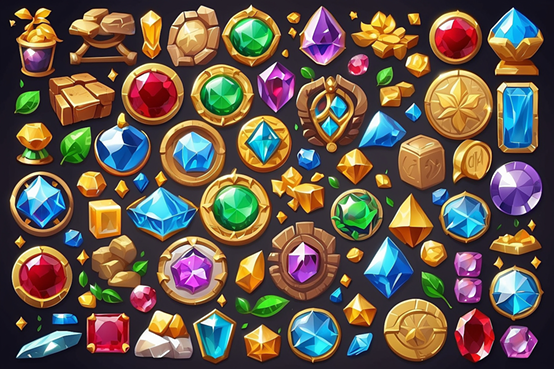Whether you're a casual player, a gaming enthusiast, or simply curious about this phenomenon, this comprehensive overview will provide you with a deeper understanding of what these games are and how they have shaped the modern gaming landscape.
History of Social Network Games
Social network games first gained prominence in the late 2000s, with Facebook emerging as the primary platform for these titles. One of the earliest and most influential examples was Zynga's FarmVille, released in 2009. FarmVille allowed players to manage virtual farms, plant crops, and raise livestock, all while interacting with their Facebook friends. The game's success paved the way for numerous other titles that followed a similar formula, such as CityVille, FrontierVille, and Café World.
As these games gained traction, developers began experimenting with different genres and mechanics. Puzzle games like Candy Crush Saga and Bubble Witch Saga became immensely popular, offering simple yet addictive gameplay that could be enjoyed in short bursts. Strategy games like Clash of Clans and Mafia Wars introduced more complex gameplay elements and player-vs-player competition.
Characteristics of social network games
Social network games have several distinct characteristics that set them apart from traditional video games. These features have contributed to their widespread popularity and have made them accessible to a broad audience, including those who may not consider themselves gamers.
Accessibility and casual nature
One of the most significant aspects of social network games is their accessibility. These games are designed to be easy to learn and play, with simple controls and intuitive interfaces. They often feature colorful graphics and engaging animations that appeal to a wide range of users. The casual nature of these games allows players to enjoy them in short sessions, making them perfect for quick breaks throughout the day.
Social interaction and collaboration
As the name suggests, social interaction is a core component of social network games. These games encourage players to connect with their friends, family, and even strangers within the game's community. Many titles offer features such as gifting, resource sharing, and collaborative tasks that foster a sense of camaraderie and encourage players to work together towards common goals.
Free-to-play model and in-game purchases
Social network games typically operate on a free-to-play model, meaning that players can access the game without any upfront costs. This low barrier to entry has been a significant factor in the widespread adoption of these games. However, most of these games offer in-game purchases, allowing players to buy virtual items, currency, or power-ups to enhance their gameplay experience or progress more quickly.
Regular updates and events
To keep players engaged and coming back for more, social network game developers regularly release updates and host special events. These updates may introduce new content, such as additional levels, characters, or storylines, while events often provide limited-time challenges or rewards. The constant stream of fresh content and the fear of missing out (FOMO) on exclusive items or bonuses help maintain player interest and encourage long-term commitment to the game.
Popular genres and examples
Social network games come in a wide variety of genres, each offering unique gameplay experiences and catering to different player preferences. From simulations that allow players to manage virtual worlds to puzzles that challenge their problem-solving skills, there is a social game for everyone.
Simulation games
Simulation games are one of the most prominent genres in the social network gaming space. These games allow players to manage and develop virtual environments, such as farms, cities, or restaurants. Players must make strategic decisions, gather resources, and interact with other players to progress. A popular example is The Sims Social, which lets players create and control virtual characters in a simulated world.
Puzzle games
Puzzle games are another popular genre among social network gamers. These titles challenge players to solve problems, match colors or shapes, or clear obstacles within a limited time or a set number of moves. The simple yet addictive nature of these games makes them perfect for quick play sessions. Candy Crush Saga, a match-three puzzle game, has been one of the most successful titles in this genre, with millions of daily active users.
Strategy games
Strategy games on social networks offer players the opportunity to build and manage virtual empires, armies, or criminal organizations. These games often involve resource management, base-building, and player-vs-player combat. Clash of Clans, a game where players build villages and battle against other players' armies, has been a standout success in this genre. Mafia Wars, which allows players to create and manage virtual criminal empires, is another notable example.
Casino and card games
Social casino games have gained significant popularity, offering players the excitement of traditional casino games like poker, slots, and blackjack without the risk of losing real money. These games often feature virtual currencies and social elements, such as leaderboards and the ability to gift items to friends. Zynga Poker, one of the earliest and most successful social poker games, and Slotomania, a popular slot machine game, are prime examples of this genre.
Social aspects and player interaction
One of the key factors that sets social network games apart from traditional video games is the emphasis on social interaction and player collaboration. These games are designed to encourage players to connect, communicate, and work together, creating a sense of community and fostering long-lasting friendships.
Connecting with friends and collaborative gameplay
Social network games provide a platform for players to connect with their existing friends and make new ones from around the world. Many games offer features that allow players to sync their social media accounts, making it easy to find and play with friends. Additionally, in-game chat systems, forums, and messaging tools enable players to communicate, share tips, and form new friendships based on their shared interests. Many of these games include collaborative gameplay elements that require players to work together to achieve common goals. For example, players may need to join forces to complete a difficult level, construct a shared building, or participate in time-limited events. These collaborative experiences create a sense of camaraderie and encourage players to support and rely on one another. Additionally, some games host regular social events, such as tournaments or seasonal festivals, that bring the community together and offer unique rewards for participation.
Gifting, resource sharing, and leaderboards
Gifting and resource sharing are common features in social network games that encourage player interaction and collaboration. Players can send virtual items, resources, or currency to their friends, helping them progress through the game or complete specific tasks. This reciprocal exchange fosters a sense of goodwill and strengthens social bonds within the game community.
Additionally, these games often incorporate leaderboards that rank players based on their achievements, scores, or progress. These leaderboards can be global or limited to a player's friends list, encouraging friendly competition and motivation to improve. Some games also feature player-vs-player battles or challenges, allowing friends to compete against each other in a lighthearted manner.
Monetization and business model
The monetization and business model of social network games has been a topic of great interest, as these games have generated significant revenue for their developers and publishers.
Freemium models and in-game purchases
Social network games typically adopt a free-to-play model, which allows players to access and enjoy the game without any upfront costs. This low barrier to entry has been crucial in attracting a wide audience, as players can try the game risk-free. However, most games also incorporate a freemium model, where players can choose to purchase virtual items, currency, or bonuses to enhance their gameplay experience or progress more quickly.
In-game purchases form the backbone of the monetization strategy for most of these games. Players can buy virtual currencies, such as coins or gems, which can then be used to acquire various in-game items, power-ups, or resources. These purchases can range from small, micro-transactions to larger bundles, catering to different player preferences and budgets. Some games also offer premium or exclusive items that can only be obtained through real-money transactions.
Advertising, brand partnerships, and revenue generation
In addition to in-game purchases, social games often generate revenue through advertising and brand partnerships. Some games display ads between levels or during loading screens, while others offer rewarded video ads, where players can choose to watch an advertisement in exchange for in-game bonuses. Brand partnerships involve collaborating with real-world companies to promote their products or services within the game, such as sponsored events or branded virtual items.
The combination of free-to-play accessibility, in-game purchases, and advertising has proven to be a highly lucrative business model for social network games. Successful titles can generate millions of dollars in revenue each month, with a significant portion coming from a small percentage of high-spending players known as "whales." The low cost of distribution through social networks and the ability to continuously update and add new content has contributed to the long-term profitability of many of these games.
Cryptocurrency, gambling, and betting in social games
As these games have evolved, they have begun to incorporate new technologies and trends, such as cryptocurrency and blockchain. The integration of these elements has led to the emergence of new gaming experiences, including the ability to earn, trade, and gamble with virtual assets. However, the rise of cryptocurrency and gambling in social games has also raised concerns about regulation and potential risks.
Blockchain-based social games & cryptocurrency
Blockchain technology has opened up new possibilities for social network games, enabling the creation of decentralized, transparent, and secure gaming platforms. Blockchain-based games often feature unique digital assets, such as non-fungible tokens (NFTs), which represent ownership of in-game items or characters. These assets can be bought, sold, or traded on blockchain marketplaces, creating a new level of player interaction and economy within the games.
Some of these games have begun to integrate cryptocurrency as a means of facilitating in-game transactions. Players can use cryptocurrencies like Bitcoin or Ethereum to purchase virtual items, currency, or access to exclusive content. The use of cryptocurrency can provide a more secure and transparent payment system, as well as enable cross-border transactions without the need for traditional financial intermediaries.
Social casino games and virtual gambling
Social casino games, which simulate traditional casino games like poker, slots, and blackjack, have gained popularity on social networks. These games often use virtual currencies and don't require real money to play, but they may offer the option to purchase additional virtual chips or coins. Some social games have also introduced virtual gambling elements, such as the ability to bet on the outcome of player-vs-player battles or tournaments, blurring the line between gaming and gambling.
The integration of cryptocurrency and gambling elements in social network games has raised concerns among regulators and policymakers. There are questions about the potential for money laundering, underage gambling, and the need for proper oversight and consumer protection. Some countries have begun to introduce regulations specifically targeting social games that involve gambling or cryptocurrency, while others have banned these games outright. As the social gaming landscape continues to evolve, developers and platform operators will need to navigate an increasingly complex legal and regulatory environment.
Impact on the gaming industry
Social network games have significantly influenced the gaming industry, transforming traditional models and shaping the development of new gaming experiences. Their success has caught the eye of industry giants, resulting in substantial investments, acquisitions, and strategic collaborations.
Disruption of traditional gaming models to mobile gaming
The rise of these games has challenged traditional gaming models, particularly in terms of distribution, monetization, and player engagement. They have demonstrated the power of free-to-play and freemium models, showing that it's possible to generate significant revenue without charging players upfront. The ability to reach massive audiences through social networks has also reduced the need for traditional marketing and distribution channels, lowering barriers to entry for smaller developers.
They have also played a significant role in the growth of mobile and casual gaming. Many successful social games have been adapted for mobile platforms, leveraging the increasing popularity of smartphones and tablets. Their casual nature, combined with their simple mechanics and short play sessions, has made them appealing to a wide range of users, including those who don't consider themselves traditional gamers. The success of social games has encouraged the development of more casual and mobile-friendly titles across the industry.
Acquisitions and investments in social game developers
The financial success of social network games has attracted the attention of major gaming companies, leading to a wave of acquisitions and investments in the space. Companies like Zynga and King have been acquired for billions of dollars by larger entities looking to capitalize on the social gaming market. These acquisitions have provided social game developers with access to greater resources and expertise, enabling them to create more ambitious and polished titles.
Crossover with mainstream gaming trends
As they have evolved, they have also begun to incorporate elements from mainstream gaming trends, such as battle passes, season-based content, and e-sports-style competitions. Many social games now feature more complex mechanics and in-depth progression systems, blurring the line between casual and core gaming experiences. This crossover has helped to broaden the appeal of social games and attract players from traditional gaming backgrounds, further cementing their influence on the industry as a whole.
Controversies and criticisms
While social network games have achieved remarkable success and popularity, they have also faced their fair share of controversies and criticisms. From concerns about addiction and excessive gameplay to questions about data privacy and exploitative monetization practices, these games have come under scrutiny from various stakeholders.
Excessive gameplay and Privacy Concerns
One of the primary concerns about social network games is their potential to foster addiction and encourage excessive gameplay. The casual nature of these games, combined with their social elements and psychological rewards, can make them highly engaging and difficult to put down. Some players may find themselves spending hours playing, neglecting other aspects of their lives. This has led to discussions about the need for responsible game design and the inclusion of features that promote healthy gaming habits.
They often rely on the collection and analysis of user data to personalize experiences, target advertisements, and improve gameplay. However, this has raised concerns about privacy and the potential misuse of personal information. Players may be unaware of the extent to which their data is being collected and shared, leading to questions about transparency and consent. The Cambridge Analytica scandal, which involved the improper harvesting of Facebook user data through a social media app, highlighted the risks associated with data collection in the social gaming space.
Exploitative monetization practices and Intellectual property disputes
While the free-to-play model has made social games accessible to a wide audience, it has also been criticized for its potential to exploit players through aggressive monetization practices. Some games have been accused of using manipulative techniques, such as limited-time offers or the fear of missing out, to encourage players to make in-game purchases. There have also been concerns about the targeting of vulnerable populations, such as children or those with addictive tendencies, with these monetization tactics.
The success of popular social network games has led to numerous cases of cloning and intellectual property disputes. Developers have accused others of copying their game mechanics, visual styles, or even entire game concepts. This has resulted in legal battles and public controversies, with some high-profile cases garnering significant media attention. The ease of copying and distributing games on social networks has made it challenging for developers to protect their intellectual property and maintain their competitive edge in the market.
Educational and training applications
While social network games are primarily known for their entertainment value, they also have the potential to be used for educational and training purposes. By leveraging their engaging and social nature, developers and educators can create experiences that promote learning, skill development, and knowledge sharing.
Potential for educational and training content within social games
Many titles in the genre already incorporate elements that could be adapted for educational and training purposes. For example, virtual city or business management simulations could be used to teach principles of economics, urban planning, or entrepreneurship. Puzzle-based challenges that encourage problem-solving and critical thinking could be designed to develop specific cognitive skills or teach scientific concepts. The genre's social aspects, such as collaboration and competition, could also be harnessed to promote teamwork and knowledge sharing among learners.
Gamification of learning and skill development
Gamification, or the application of game design elements in non-game contexts, has become increasingly popular in recent years as a way to engage and motivate learners. Social network games provide an ideal platform for gamifying educational and training content, as they already incorporate many of the key elements of successful gamification, such as rewards, feedback, and social interaction. By designing educational content that feels like a game, developers can make learning more fun and engaging, increasing motivation and retention.
While still a relatively niche area, there are already some examples of social games designed specifically for educational and training purposes. For instance, McGonigal's SuperBetter is a social game that aims to help players build resilience and overcome real-life challenges through gamified tasks and social support. Other examples include language learning games like Duolingo, which incorporate social elements like leaderboards and competitions, and brain training games like Lumosity, which challenge players to improve their cognitive skills through daily exercises and social challenges.
Benefits and challenges of using social games for educational purposes
Using social network games for educational and training purposes offers several potential benefits. They can make learning more engaging and interactive, increasing motivation and retention. They can also foster social connections and collaborative learning, allowing players to learn from and support one another. However, there are also challenges to consider, such as the need to ensure that educational content is accurately and effectively integrated into gameplay, and the potential for distractions or off-task behavior. Educators and developers must also consider issues of accessibility, privacy, and data security when using social games in educational contexts.
Future trends and developments
As technology continues to advance and player preferences evolve, social games are poised to undergo significant changes in the coming years. Developers and publishers are exploring new ways to enhance the social gaming experience, leveraging emerging technologies and adapting to shifting market trends.
Integration with virtual and augmented reality
Virtual reality (VR) and augmented reality (AR) technologies are becoming increasingly sophisticated and accessible, opening up new possibilities. Developers are experimenting with VR and AR integration to create more immersive and engaging social gaming experiences. For example, players may be able to explore virtual worlds together, interact with shared AR objects, or participate in face-to-face multiplayer sessions within a virtual environment. As VR and AR devices become more widespread, we can expect to see more social games designed specifically for these platforms.
Expansion to new social platforms and devices
Social media games have primarily been associated with platforms like Facebook and mobile devices, but the future may see these games expand to other social networks and devices. For example, messaging apps like WhatsApp, WeChat, and Telegram, which have massive user bases, could become new frontiers for social gaming. Additionally, the growth of smart home devices and wearables may create opportunities for social games that integrate with these technologies, allowing players to interact with games through voice commands, gestures, or even biometric data.
The future of social network games may see a greater emphasis on cross-platform play and progression, allowing players to access their games and social connections seamlessly across multiple devices and networks. This would enable players to start a game on their smartphone, continue playing on their PC, and then pick up where they left off on a gaming console, all while maintaining their social ties and in-game progress. The development of cloud gaming services and the adoption of common standards for game development could help facilitate this cross-platform future.
Evolving monetization strategies
As the social gaming market becomes more competitive and regulated, developers may need to adapt their monetization strategies to remain profitable and comply with changing laws and user expectations. This could involve a shift towards more transparent and less exploitative monetization models, such as subscription-based services or optional paid features that don't impact gameplay. Developers may also explore new revenue streams, such as branded content partnerships or the sale of virtual real estate within game worlds.
Conclusion
Social network games have transformed the gaming landscape in numerous ways, making gaming more accessible, diverse, and socially connected than ever before. They have introduced new monetization models, player engagement strategies, and cross-platform experiences that have influenced the design and development of games across the industry. Moreover, they have expanded the definition of gaming itself, attracting new audiences and demonstrating the potential of games to serve not just as entertainment, but as platforms for learning, skill development, and social change.
As the genre continues to evolve and mature, we can expect to see ongoing innovation and experimentation. Developers will likely continue to explore new technologies, platforms, and monetization strategies, while also seeking to address concerns around addiction, exploitation, and accessibility. The educational and training potential of titles in this category is also likely to receive increasing attention, as educators and developers seek to harness the power of interactive entertainment for learning and skill development.
Despite the challenges and criticisms facing the industry, the enduring popularity and profitability of social network games suggest that they will remain a vital and influential part of the gaming landscape for years to come. As such, understanding the key aspects and trends of social network games is essential not just for players and developers, but for anyone seeking to understand the future of gaming and interactive media as a whole.
For more information email [email protected]








